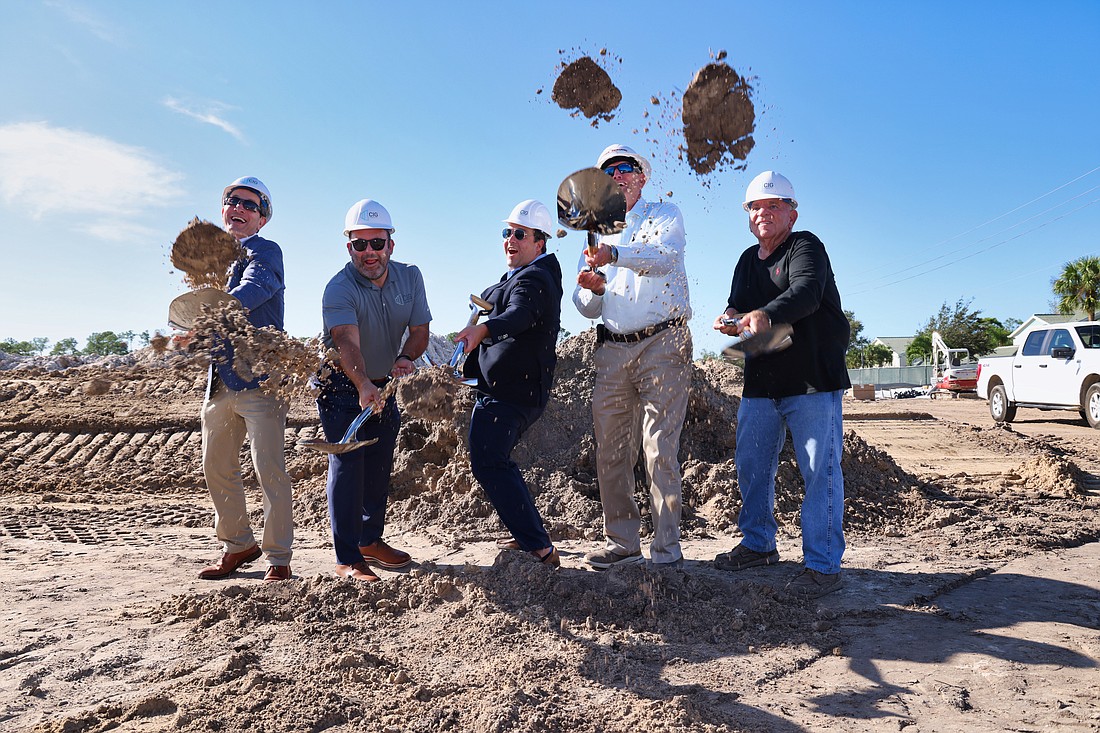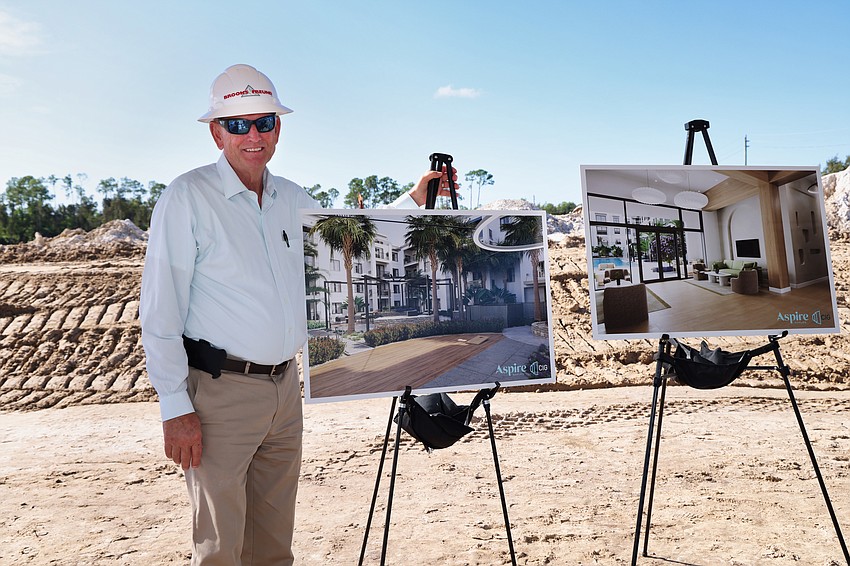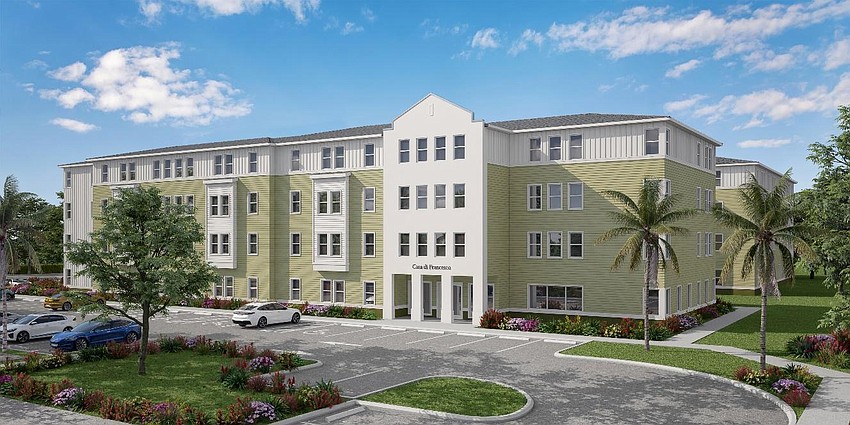- July 26, 2024
-
-
Loading

Loading

While a lot of developers will moan about bureaucratic interference when it comes time to move forward with a project, Gregg Fusaro will tell you that if it wasn’t for lawmakers the site of his company’s new apartment complex would likely be a vacant lot today.
But it isn’t. Thanks to the government.
Fusaro is a partner at the development firm CIG Communities. Earlier this year, as the company was getting ready to move forward with a new 233-unit apartment complex on Immokalee Road in north Naples, it became clear the finances weren’t going to work.
When CIG first underwrote the deal a couple of years back, the interest rate was 5% and the property insurance was $600 per unit. But things had changed dramatically. As the Naples developer approached closing and the start of work, the interest rate had jumped to almost 8% and the cost of insurance had doubled to $1,600 per unit.
Fusaro says the company was faced with a choice: Absorb the cost or, as other developers have been doing in the past year, pull out.
“We don't have to do deals, you know,” says Fusaro. “We like to do deals, that's where we create wealth. But we don't have to. We don't have to do a development tomorrow or next month. And so, if we have to wait, we will.”

But there was a twist. Turns out a provision in the recently enacted Florida affordable housing legislation dubbed the Live Local Act changed CIG’s thinking.
And thanks to that provision, rather than walking away the developer broke ground Oct. 9 on Aspire Naples, an apartment community where 30% of the units — 71 — will be below market rate for “qualified residents who live and work in Collier County.”
The difference between waiting and breaking ground was a tax abatement provision in the law that allowed CIG, which had originally planned for 70 units to be set aside for affordable housing, to compensate for the increase in costs.
“The Live Local Act was absolutely critical for us on this project because it gave us some offset to the other operating costs that have just gone through the roof,” Fusaro says.
The Live Local Act — SB 102 — is a bipartisan affordable housing plan passed by Florida’s Legislature earlier this year intended to provide $711 million in funding for housing programs. It is aimed, in part, at increasing the availability of housing and providing down payment assistance.
The Senate passed the act unanimously March 8 and on March 24 the House passed it 103-6 — 10 members abstained. It was signed into law by Gov. Ron DeSantis March 29 and went into effect July 1.
The money went to the Florida Housing and Finance Corp. in order for it “to create or build upon housing programs.”
Among those, the State Apartment Incentive Loan program got $259 million to provide low-interest loans to developers building workforce housing and the State Housing Initiatives Partnership program got $252 million to provide local governments with incentives to build partnerships with developers who are preserving available housing or producing more housing.
“The funding that is in the Live Local Act is helping us directly be able to make the numbers work on more sites,” says Shawn Wilson, president and CEO of the prolific St. Petersburg affordable housing developer Blue Sky Communities.
Blue Sky, like CIG, has already tapped into resources provided by the act.

In its case, Blue Sky got $4.3 million in funding to help build a 140-unit apartment project it has been working on called Casa di Francesco. The community is being built on property owned by the St. Francis of Assisi Catholic Church on State Road 579 in Mango, about 1.5 miles south of Interstate 4 between Tampa and Plant City.
Wilson says the company will apply for additional funding for other projects as well, and is actively looking for sites that could take advantage of another provision in the law.
According to an alert prepared by the law firm Holland & Knight in August, the act mandates that local governments authorize “the development of multifamily rentals on sites that are zoned as mixed-use residential, commercial or industrial if at least 40% of the residential units in a proposed multifamily development will, for a period of at least 30 years, be affordable to individuals making up to 120% of the local area median income.”
In other words, four out 10 apartments in a proposed complex have to be set aside for tenants who qualify in order for a developer build on one of those sites.
It also orders municipalities to apply the highest allowed density for proposed multifamily developments.
These two rules are meant to eliminate one of the biggest hurdles cities, counties and developers face when trying to increase affordable housing in communities: Neighborhood opposition.
The law allows localities to move forward with projects while skipping the loud and sometime disruptive public meetings that hold up — and sometimes kill — projects. And local officials say the public’s point of view is not completely eliminated from discussions.
Developers still will need to meet local regulations in an area and build within the parameters of the community. And residents will still get a say on issues like landscaping, setbacks and parking standards.
Given that the law and political realities are likely to come into conflict at some point, Blue Sky is moving slow on Live Local Act projects.
“We never want to go to a city or a county and say you must approve something,” Wilson says. “So, we still want to make sure that the site is something that the city and the county can embrace. This is going to be an affordable housing asset, it's going to have government funding in it. And so, regardless of what the act says, we're not intending to force anything or push anything in a city or county that doesn't really want it.”
As with all new laws and rules, it will take a bit of time for all involved to fully grasp all of what the Live Local Ac brings. This will be especially true for the localities and the officials — elected and otherwise — who will be on the front line of making sure it is implemented properly.
In Pinellas County, developers are already looking at redeveloping industrial sites as projects with substantial affordable housing components, says Teresa Brydon, a business development manager for Pinellas County Economic Development.
While the need for affordable housing is great and she understands that it has to be done, Brydon urges caution. She says not all industrial sites are created equal and that while some will be conducive to housing, many others won’t be.
And choosing the wrong place to build residences could lead to trouble later.
She points to a project in Georgia where a paper mill gave some of its land to the local community. A hospital was built on the site first and later an apartment complex.
Before too long, both the hospital and residents began to complain to the city about the smell from the mill and the city eventually forced the mill to shut down.
“Do you really want to bring residential components into the Hercules Industrial Park? No, you just don't, because then you face that challenge,” she says. “And that's the thing. You just hope that as people look at sites, that they consider the ramifications.”